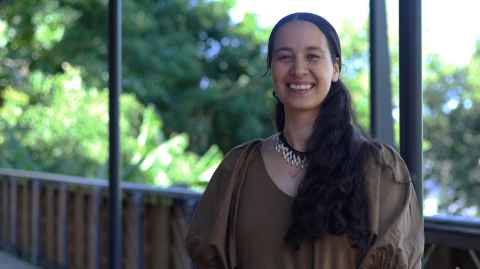Research journey to help Pacific young people is path to Harvard University for Dr Therese Lautua.

The Manurewa born and raised 31-year-old academic will skip Aotearoa's winter this year when she heads to Boston, Massachusetts with husband Chris and their two young daughters, Kiely and Vianney.
She will take up a teaching position as a College Fellow in Indigenous Religion at Harvard University.
The University of Auckland lecturer came across the opportunity on the Native American and Indigenous Studies Association (NAISA) website. The programme identifies exceptional scholars, like Dr Lautua (Lalomanu, Poutasi, Amaile, Samusu) who have recently completed their doctoral work and demonstrated a strong commitment to teaching in an area of specialisation.
"It's going to be a great experience because I'll have time to also do my own research, as well as being mentored for career development."
She recalls a number of shocking events within the Pacific youth community, that compelled her on a different path, while completing her bachelors degree almost a decade ago.
"I have always worked with young people, I loved it and I wanted to be a teacher but towards the end of my degree, I remember there were a number of suicides. I wanted to do something practical to help. I found I was good at research," she says.
Faith is something very important to me, colonial beliefs are interwoven with Christianity and influence Pacific people today, particularly with changes over time (climate change, sexuality) and the impact of colonisation, Dr Therese Lautua.
Dr Lautua recognised supporting Pacific peoples with their mental health and well-being required getting more Pacific people 'around the table'.
She embarked on an academic journey with her doctoral thesis that explored 'God in the 21st century' and how images of God and cultural identity affected mental well-being.
"Faith is something very important to me, colonial beliefs are interwoven with Christianity and influence Pacific people today, particularly with changes over time (climate change, sexuality) and the impact of colonisation."
She says taking her Pacific worldview to a learning environment such as Harvard is important given how little is known about the region and Pacific people in Aotearoa, New Zealand.
Shifting to the other side of the world will bring a new set of challenges Dr Lautua says. The University's Theological and Religious Studies comprises four academics compared with Harvard's team of more than 30 academics across the Committee for the Study of Religion in the Faculty of Arts and Science.
She's also aware that relocating overseas with very young children (her youngest daughter was born last year) away from her close-knit family, parents Des and Anna Kiely, and younger sister Margaret, won't be easy.
"We're going to have to start our own networks… because I have always been a homebody from Manurewa," she says, while also contemplating Boston's climate where it snows from November to March with summers that reach up to 30 degrees.
"My parents are going to miss the girls but they're also really excited. They saw me through the whole period, trying to apply for the next thing. They are really involved in our faith community and everything I've learnt comes from them. It's just a short time and hopefully they'll come over."
Dr Lautua is grateful for the village of academics that wrapped around her to secure the Harvard role; including the strong backing of Waipapa Taumata Rau staff: Pro Vice-Chancellor Pacific Professor Jemaima Tiatia-Siau, Associate Professor Lisa Uperesa, Associate Professor Michael Mawson, and Professor Maartje Abbenhuis. She also acknowledged Dr Brian Kolia from Malua Theological College in Samoa and Toeolesulusulu Professor Damon Salesa, Vice-Chancellor of AUT.
The College Fellow in Indigenous Religion is a one-year contract renewable for a second year.






